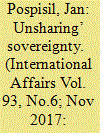| Srl | Item |
| 1 |
ID:
143563


|
|
|
|
|
| Summary/Abstract |
Resilience’ has quickly risen to prominence in international security and development circles. In recent years it has found its way into political discourse on state building and state fragility, triggering a vast but often conceptually indistinct examination of the subject. Given its meaning in policy publications and guidelines, ‘resilience’ tends to eschew a static conceptualisation of statehood, turning instead to a more dynamic, complex and process-oriented rendering of state–society relations. This illustrates a conceptual shift from ‘failed states’ to ‘fragile states and situations’. It also transforms the concept of ‘failed state’ as a mere threat perception – with ‘stability’ as its logical other – into ‘fragility’ as a particular form of social and political risk. This paper analyses the concepts in 43 policy papers, focusing on the nexus of ‘resilience’ and ‘fragility’ in international state building, and assesses potential consequences. What does ‘resilience’ – as the opposite vision to ‘fragility’ – in fact mean? What is the practice derived from this chimerical state of states?
|
|
|
|
|
|
|
|
|
|
|
|
|
|
|
|
| 2 |
ID:
157975


|
|
|
|
|
| Summary/Abstract |
In order to work, international peace- and statebuilding has had to reshape the traditional notion of state sovereignty and legitimize increasingly interventionist endeavours in terms of an attenuated ‘shared’ sovereignty. Over the last decade, however, governments in recipient states have pushed back, demanding a more active role in negotiating with their OECD counterparts. The g7+ group, an international organization of now 20 self-proclaimed fragile states, has evolved as a key actor from the global South dealing with international peace- and statebuilding. The group's approach to multilateral negotiations on development goals, and its creative use of donor concepts and approaches such as resilience, ownerships and measuring development progress, challenge the customary peace- and statebuilding practices. This challenge demonstrates that political elites in fragile states have started to self-confidentially occupy the arenas of statebuilding and development. This article argues that in so-doing the g7+ group establishes a post-liberal sovereignty claim that is based on two pillars: resilient nationhood, and selectivity in the application of global liberal principles. Since it relies on the development policy principle of national ownership, such post-liberal sovereignty is difficult to counter for actors subscribed to liberal norms. Effectively, sovereignty is ‘unshared’ again.
|
|
|
|
|
|
|
|
|
|
|
|
|
|
|
|